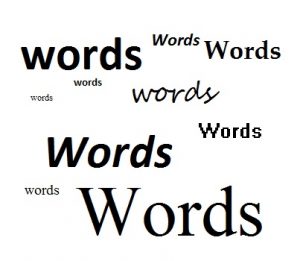Posts by Dave King
“Before we begin our banquet, I would like to say a few words. And here they are: Nitwit! Blubber! Oddment! Tweak!” J. K. Rowling, Harry Potter and the Sorcerer’s Stone
Whether it’s Dickens struggling to find the perfect character name or Rachel Maddow working to introduce the word “kerfuffle” into our political discourse, a love of words tends to inspire and delight the people who make a living with them. They flow trippingly from the tongue. You can crunch them between your teeth. They reveal odd corners of our linguistic history. They’re just fun.
So how do you use your love of words in telling your story?
I’ve written before about the dangers of letting your language get in the way of your characters. When the original, beautiful, flowing language comes from you rather than them, you run the risk that your readers are going to notice the writer behind the curtain. You don’t want your language to drag them out of the immersion in your world that is the main reason for reading. Besides, writing your narrative in your characters’ voices rather than your own is just too powerful a character-creation tool to ignore. So don’t exercise your love of words unless your characters have a love of words.
Note: this doesn’t mean all your characters have to be sophisticated and erudite, with obscure and glowing vocabularies. I’ve often come across a fresh and surprising use of words from people who didn’t necessarily have a formal education. Like the man here in Ashfield who once told me, “Well, I was married for eight years, with another one for six years, been with the one I’m with now for ten years, and that’s half my life chewed up.” I still treasure that particular use of language.
Words can build worlds as well as characters. I don’t think anywhere but England could have produced “whinge,” which is either a whiny cringe or a cringing whine, depending on whom you ask. England also gave us “coddiwomple:” to travel purposely without a clear destination in mind. I’ve read that all of Greek philosophy rests on the Greek linguistic trick of turning an adjective into a noun by adding a definite article – i.e. “the good, the true, and the beautiful.” And recently a guest on a late-night talk show mentioned her favorite, archtypically German word – backpfeiffengesicht, literally “cheek-slap face.” It’s generally translated as “a face that cries out to be punched.”
Read MoreYears ago I attended a charity fundraiser involving the Coney Island Polar Bear Club – a swim club that takes a dip in the ocean off Coney Island Beach every New Year’s Day. At the event, the charity used a chainsaw to open up a small pool – maybe five by ten yards – in the six-inch-thick ice of a frozen lake. Then the Polar Bear Club hopped in and paddled around while the charity sold hot chocolate and chili to sympathetic onlookers.
One of the polar bears told me the trick. If you’re afraid of the cold, if you fight it, your body assumes that you’re freezing to death. Even if you try to ignore the cold, your body won’t buy it and pulls blood away from your skin to keep the important stuff – heart, brain, lungs – going. That’s what makes the cold so painful. But if you embrace the cold, if you welcome it as a friend, then your body’s good with it, too, and sends the blood out to your skin to keep you warm. This is why the club members swimming among the ice chunks were bright, lobster red.
It’s only natural to fear writer’s block. When you’re staring at a blank page with no idea what to type, or when you type a page then delete it ten minutes later because you can’t stand to look at it, you might feel like you’ll never write again. It’s terrifying.
A lot of articles on writer’s block will tell you that it’s often nothing more than fear, feeding on itself. Just suck it up and power through, and it will go away. Or take a break and walk away, then come back to your novel after you’ve calmed down. This approach sometimes works. But it would be even better to embrace your writer’s block the way the Polar Bear Club embraces the cold.
Read MoreIf you’ve read much about the art of writing, you know that your action has to change your main characters in some way if you want to engage and satisfy your readers. You can avoid pitfalls and take advantage of opportunities by thinking of this change as a separate, inner plot woven through your outer plot.
When your characters see something that transforms how they view the world, that’s an inner plot twist. When they’re facing some conflict that’s tearing them apart, that’s inner tension. This inner plot can and should interact with the outer plot, but it has its own pace and logic.
Of course, a lot of good, well-written and fun novels don’t pay much attention to the inner plot. Adventure novels, from Dumas’ Musketeer stories to Dan Brown’s international puzzle quests, are almost purely edge-of-your-seat action – all about the outer plot. And a lot of literary fiction – Virginia Wolfe, for instance – explores the development of the characters’ inner lives, with what little action there is forming more of a background.
But even if a story leans heavily one way or another, it will be more memorable when it works on both levels. I’ve already written a bit about the need for some external action, even in the most inner-driven novels. The reverse is true, as well. The Da Vinci Code is a romp, but by the end, Robert Langdon has come in contact with a religious faith that leaves his world a little larger.
Read MoreOnce again, the comments section of last month’s article sparked enough ideas to inspire a whole new article. In this case, someone asked how you let your characters’ cultures shape who they are without creating stereotypes – slow-moving southerners, taciturn Yankees, or excessively polite Canadians?
The obvious answer is that culture isn’t the only influence on your characters. Just show these other elements — education level, childhood trauma, various accidents of birth – at play as well. We’re all a mishmash of all sorts of different influences, and how they work together or against one another is what makes us unique.
But this raises the larger question of how you balance all these elements, showing how they reinforce and undermine one another? How do you turn all these variables into a single, plausible person? I’ve seen too many characters who are the product of a single source — psychopaths with childhoods filled with sex and violence or emotionally needy characters who lost their parents at an early age. While a single influence might occasionally predominate – psychopaths often have abusive childhoods – all your characters need some balance to be individuals.
Read MoreThis summer, our niece and her family came up from Virginia to our home in the wilds of Western Massachusetts. While we were driving through the countryside checking out local craft breweries, she mentioned that the houses we passed, even the smaller, less-expensive ones, were neater and better cared for than what she saw back home.
I think it’s the weather, particularly the regularly-scheduled natural disaster that New Englanders call winter. We know it’s coming, we know what it will be like, we know what we need to do to get ready. And if you don’t get things done before the snow flies, you’re stuck with them until spring. That hard deadline tends to make people take responsibility for getting the fence painted or the bushes trimmed.
By contrast, I grew up in West Pittston, Pennsylvania, a small town on the Susquehanna River halfway between Wilkes-Barre and Scranton. Back in 1959, when the area’s main industry was anthracite coal, one mining company dug a little too close to the underside of the river, opening a hole that let most of the Susquehanna drain into the mines. In the three days it took to plug the hole, ten billion or so gallons of water poured into the tunnels, shutting down the area’s economy all at once and beginning to rot the supports for the mine shafts laced beneath the entire valley.
So in addition to ongoing depression, I grew up in a place where, every once in a while, someone’s backyard would disappear, leaving behind a gaping hole with brackish low-grade sulfuric acid – which is what you get when you steep anthracite coal in water for a couple of years – at the bottom. The entire town sagged subtly downhill on either side of Nassau Street, which followed the solid ground between two mining companies. In addition to watching the town sink, we got to play on the column dumps – the huge mounds made up of oil shale that was separated from the coal on multi-story breaker columns and simply piled nearby. The largest column dump in town – relatively small by local standards — covered roughly a quarter of a mile square and was known to us kids as the Black Desert. Fun fact? Oil shale burns, so every once in a while, older kids would get a tire fire started and set the column dumps ablaze. The soft, blue flames outlining the mounds of shale can actually be kind of pretty, as long as you’re upwind.
Growing up in Mordor gives you a very different outlook on life than growing up in New England.
Read MoreA lot of what I do involves helping writers give readers what they expect, and what readers expect has changed over the years. Many modern novels include sex scenes or language that would have gotten them banned sixty or seventy years ago. Movies and television have made readers less patient with leisurely story development than they used to be. Even little things like tolerance for –ly adverbs has evolved over time.
But it’s worth looking at the principles of storytelling seem to hold steady, even while others shift with the culture. These editorial constants are a way to understand what a story really is and how writers habitually go wrong in telling them. If your storytelling is out of step with your times, then updating your skills is not a serious problem. But when you’re out of step with the ages, then your facing something more fundamental, and harder to fix.
For instance, writers have apparently always been partially blind to how well their writing comes across to their readers. This leads them to include either too much detail or too little. In Mark Twain’s epic 1895 takedown of James Fennimore Cooper, Twain lists a series of literary “rules” that Cooper violates. For instance, an author shall:
Say what he [or she] is proposing to say, not merely come near it.
Use the right word, not its second cousin.
Eschew surplusage.
Not omit necessary details.
Twain shows how to apply these principles in a second essay (published posthumously in 1946), in which he actually line-edits a paragraph of Cooper, improving it substantially by simply removing nearly a third of the words. Many of his edits yank out elaborations of points that are already obvious and unnecessary descriptions of emotion, something I still do a lot of today. His cuts are in italics.
Read More“Come for the incest, stay for the dragons.”
– Seth Meyers on Game of Thrones
photo courtesy HBO
The second time we see Jaime Lannister in Game of Thrones, he shoves ten-year-old Bran Stark out a window because Bran has just seen Jaime making love to his twin sister Cersei. (Bran does survive, but that wasn’t what Jaime intended.) In most works of fiction, there’s no coming back from something like that – incest and attempted child murder gets you branded as a monster for the rest of the story. But as Game of Thrones progresses, readers learn to like and, in some ways, even admire Jaime. How does George R. R. Martin do it?
It’s because he is a master of the technique we talked about last month – creating sympathetic characters in a culture that is decidedly unsympathetic. Martin has managed to create a plausible medieval-like society. But he goes far beyond the usual physical details of a swords-and-sorcery world and into the deep roots of the culture. The different rules he has built into Westeros shape the lives of his characters and make Jaime Lannister possible.
Incidentally, if you haven’t read the books – or seen the HBO series, which follows the books closely – you might want to stop reading. I intend to throw around spoilers with wild abandon.
The first difference is that life is cheap in Westeros. From the time Eddard Stark, one of the most sympathetic characters in the first book, lost his head, Martin became infamous for killing off likable characters, often in wholesale lots. But this isn’t just a bad habit on his part. It’s a realistic portrayal of the world he’s created.
Martin’s Westeros, like medieval Europe, is a place where solders in the winning army feel justified in raping and pillaging their way across the countryside because, hey, who’s going to stop them? So unless you lived in a walled city or were rich enough to hire a sellsword to protect yourself and your family, roving bandits or bands of soldiers – including the ones who were theoretically on your side – could simply show up and slaughter you and yours. Starvation was commonplace as well, both during sieges and during the years-long winter. And I’d guess that disease was also rampant, given the description of waste disposal in Fleabottom, the poor section of the capital city, King’s Landing.
Against this backdrop of short and brutal lives, the attempted murder of Bran, just one of Eddard Stark’s three sons (four, counting his bastard Jon Snow), is not that much of a tragedy. As the oft-repeated High Valyrian saying runs, valar morghulis. All men must die.
Read MoreA few years ago, I read Xenophon’s The Education of Cyrus. I’d heard that Thomas Jefferson admired Cyrus as a leader and wanted to find out why. Before long, I came across this bit of advice Cyrus’ father gave him about resupplying his troops during wartime.
Where might you better look to find the means of obtaining supplies than to the one who has an army? Now you are marching out from here with a force of infantry . . . and you will have for cavalry to support you the Median horse, the best cavalry troops in the world. What nation, then, of those around do you suppose will refuse to serve you, both from the wish to do your side a favour, and for fear of suffering harm?
In other words, “If you need supplies, just take them. And if people give you trouble, well, you’ve got an army, don’t you?” Essentially, he would supply the troops using the same methods organized crime uses to shake down local businesses. The rest of Cyrus’ life and reign is about as enlightened as his resupply methods. Apparently what made him such a shining example of a benevolent ruler for both Xenophon and Jefferson was that he actually tried to govern the lands he conquered rather than simply raping and pillaging.
Last month we talked about how to write plausible characters who lived in a world with rigid class distinctions. But a class system isn’t the only way past cultures go off the rails by modern standards. How do you write about characters who lived in places and times that accepted and even glorified conquest as a normal part of politics? Or that viewed marriage as a matter of political and economic dealmaking that had nothing to do with love? Or that were comfortable with slavery – with the right to beat, rape, or kill people who belonged to you? Or that considered bear baiting or a good hanging to be quality entertainment?
In last month’s comments section, a reader brought up the question of how to make characters in historical novels sympathetic when they were part of cultures that modern readers now find either ridiculous or abhorrent. The example she gave was of a young woman in the Ming dynasty whose abusive father had arranged for her to marry a man she didn’t love. In the culture at the time, not obeying her father would have been unthinkable – it would have violated everything she’d been raised to believe about her duty as a daughter and as a woman. But if she gave in to her father’s wishes rather than following her heart, she’d lose the sympathy of modern readers. How do you handle a situation like that?
Read MoreRuth and I are binge watching Downton Abbey at the moment – and, yes, Maggie Smith’s Dowager is even more fun the second time around. For those of you unfamiliar with the show, it draws much of its drama from the slow collapse of the class system at the end of Edwardian Britain. This isn’t too far back in our history – many people grew up hearing stories of that time from their parents or grandparents – but it’s still a little hard to imagine a world in which your entire life was shaped by the strata of society you were born into.
In fact, it’s so hard to imagine that writers of historical fiction often get it wrong. I’ve run into too many historical novels in which the main characters ran around the world without a care, when in real life they would have needed a retinue of servants to keep up their lifestyles. I’ve seen other characters who had servants but treated them with a familiarity that’s commonplace today but unheard of in centuries past. Or characters who were servants but chafed against the restrictions of their station in life in a way earlier generations couldn’t imagine.
Jo Baker’s Longbourne, which tells the story of Pride and Prejudice from the point of view of the servants, opens with Sarah, a maid, doing the week’s laundry. As she struggles with frigid water from the pump, slippery floors, and lye soap that eats into her hands, she is acutely aware of the everyday smells and hardships that an ordinary servant of the day would have grown up with and taken for granted. And when she thinks that “really no one should have to deal with another person’s dirty linen,” she is clearly seeing her world from the point of view of someone who owns a washing machine. Did she really expect the quality to scrub their own underwear?
So make sure your historical characters are living in the history that actually happened. Lower class people in earlier ages doubtless resented their masters when those masters were cruel – there were peasants’ rebellions from time to time. But it never would have occurred to them to question the hierarchical system that had maids doing the dirty work for the aristocracy. For one thing, class distinctions were something you could see – and smell. As Sarah knew, it was a lot of work to boil water to wash clothes, so the lower classes didn’t change as often as we do today. Even as late as the nineteenth century, shirts had detachable collars and cuffs, so you could swap out the parts most likely to get dirty and wear the shirt another day – or several.
Bathing became more accepted over time – it was nearly nonexistent between Rome and the Renaissance – but required nearly as much work as laundry, so it was a luxury that the lower classes rarely experienced. Soap was harsh and expensive, shampoo and toothpaste largely unheard of, and the substitutes for toilet paper don’t bear thinking about. Not to put too fine a point on it, the peasants were revolting.
Read MoreHow do you get inside someone else’s head?
Seeing the world through the filter of someone else’s personality, history, and concerns is how you create a wide range of distinctive characters with depth and relationships that feel authentic and unpredictable. It’s how you immerse your readers into a different culture, whether it’s one from the past, the far future, or simply elsewhere on the globe. The chance to inhabit the lives of other people is why many readers read. To succeed as a writer, you need to do it very well.
But getting out of your own head and into someone else’s is a lot harder than you might think. Most people naturally assume that they’re looking at the world in the only reasonable way — they’re seeing the world as it is, not as it filters through their own personality and experiences. This is why most writers, even the best ones, tend to build their characters from themselves, or at least parts of themselves. Hence the old joke that MFA programs tend to produce first novels about MFA writers who are struggling with their first novels.
But if you want to create characters who are more independent of you, then you need to learn to see past your own filters – to get out of your own head. There are a couple of techniques that can help.
The first and most obvious is to talk to other people, preferably people who think very differently from you. I’ve found that Facebook is a good venue for this, more than Twitter – it’s just ridiculous to expect people to pack complex thoughts into 140 characters. So look online for people who disagree with you on important matters, whether it’s Evangelical Christians or atheists, Trump supporters or Bernie Bros.
Then genuinely talk to them. Don’t simply trade talking points and barbs. Don’t troll them, and stay away from people who troll you. You’re looking for people who honestly disagree with you and are willing to open up about it. If you’re like me, you’ll soon discover that the people who disagree with you aren’t necessarily ignorant, venal, or stupid. They simply have their own way of looking at the world, their own priorities. Even if you still think they’re mistaken – and they may be – you’ll understand where they’re coming from.
Read More
Man imprisoned for beating his wife: You look down on people.
Will McAvoy: Down is where some people are.
I came across that delicious line while Ruth, my wife, and I were watching what is, sadly, the final season of “The Newsroom,” the HBO drama produced and largely written by Aaron Sorkin, who was also responsible for “The West Wing.” Both shows are a continuous feast for someone interested in quality dialogue. It’s not just that the Wikiquotes page for “The West Wing” is huge. If you compare it to the Wikiquotes pages of other popular shows, you find that the other shows quote moments when the plot changes direction or the characters make a key revelation. Most of Sorkin’s quotes are simply there for the originality of the language.
So how does he do it? How do Sorkin’s characters manage to constantly say things that are so sharp and memorable? What makes his dialogue as good as it is?
First, it’s dense. Sorkin’s characters often speak one or two lines that summarize remarkably complex thoughts. In the example above, Will could have argued that claims of elitism are often a defense against deserved public condemnation. He could have said that the egalitarian ideal doesn’t mean that all people are morally equal, and there’s no reason to pretend otherwise. Instead, six words, five of them single-syllable, say everything he needs to say.
Or consider this confrontation between Toby Ziegler and a congressman, from “The West Wing” – since it is such a rich source and more easily available, most of my examples will come from “The West Wing:”
Toby: You’re concerned about American labor and manufacturing.
Congressman: Yeah.
Toby: What kind of car do you drive?
Congressman: Toyota.
Toby: Then shut up.
Of course, brevity isn’t a virtue in itself. Certain characters should be allowed to ramble on, because that’s who they are. Most of Sorkin’s characters from these two shows are journalists, speechwriters, speechmakers – people who make their livings by saying complex things in simple ways. The density of the dialogue fits their characters.
Other characters, who don’t make a living with words, speak dialogue that’s a bit looser. Josh Lyman, for instance, is the Deputy Chief of Staff on the West Wing, a job that is much less dependent on an elegant command of language. (Josh once described his job as, “The President doesn’t hold a grudge. That’s what he pays me for.”) Here’s Josh describing a disagreement. “You know what this is like? This is like The Godfather. When Pacino tells James Caan that he’s gonna kill the cop. It’s a lot like that scene, only not really.” When Josh loses control of a press briefing, here’s how he explains it to President Bartlett.
Bartlet: You told the press I have a secret plan to fight inflation?
Josh: No, I did not. Let me be absolutely clear, I did not do that. Except, yes, I did that.
Of course, good dialogue demonstrates character in ways beyond how wordy or brief it is. A character’s dialogue also reflects their education, their history, their concerns. Consider Charlie, President Bartlet’s “body man:” a combination of valet, personal assistant, and general gofer. Charlie was a high school graduate, raising his younger sister, when he first got the job, and was not […]
Read MoreIt doesn’t seem that hard at first. When you’re caught up in the thrill of creating people and telling their story, writing feels like the easiest thing in the world. You just go on doing it until you get to the end. Then you put that first work in a drawer for a month and look at it again. It doesn’t look at all like the brilliant story you remember. In fact, it sucks.
But you bear down, start reading about the craft of writing, and join a writer’s group, either online or in person (or both). You learn to spot your worst problems, follow the advice you get on fixing them, and fiddle with your manuscript until it is much, much better than when you started.
Then you collect 114 form-letter rejections.
If you’re not discouraged at this point, you park that first manuscript in a drawer for good and start the next one. You’ve already learned a lot about writing from the first one, so this one is stronger from the outset. Again, you revise it and have it critiqued and generally mess with it until it’s as good as you can get it.
This one does better. It still gets a stack of form rejections, but some of them are slightly personalized, and two agents ask for first chapter and synopsis. So you have tantalizing, month-long waits before . . . rejection.
It’s usually at this point that you lose focus. You might obsess about your technique, as if there were a particular subtlety to writing that you’re not seeing. So you build a library of writing books, read everything you can on the internet, and analyze bestselling authors to the point that pleasure reading becomes work. Eventually, you can rattle off the fourteen different ways to build micro-tension and list the eleven flavors of third-person point of view.
This all might even help. But more likely than not, while you’re refining your technical skills until you can construct a story that’s as precise as a Swiss watch, you’ll lose track of the reasons you were writing the story in the first place. I help people develop their storytelling skills for a living, so I know the value of studying the mechanics of writing. But I also know the limits. Careful study, and even great editing, can only make you competent. It takes something else to become brilliant.
Read MoreIf you were around and literate in the 1980’s, you knew Jay McInerney’s Bright Lights, Big City. You remember thinking the second-person narration was exciting, cutting edge. You lost yourself in its directness, its ability to pull you right into the story. You fell in love with the technique.
You haven’t seen much of it lately.
Every once in a while, the writing market is hit by a fad, like MacInerny’s second person narration. Epistolary novels, where the story is told through a series of documents, were big at the turn of the last century. A client who writes noir novels tells me that, at the moment, the genre is dominated by a cocktail of extreme violence and mindless profanity imported from England and known as Brit Grit.
So how do you respond to fads? Do you take them as a sign of what the public wants and try to buy in? Do you ignore them and follow your own vision? Or do you do something in between? How much should you be writing to please the market?
Of course, in some ways you can’t help writing to market. The point of writing is to give readers something they’ll want to read. This is especially true if you’re writing in a particular genre. Readers of romance, science fiction, horror, fantasy all expect their novels to deliver certain tropes, and it’s up to you to provide them. If you give your readers a mystery without a crime, detective, or denouement, then you really aren’t giving them a mystery.
But even within the most tightly-defined genres – time travel romance, for instance (an actual category on Goodreads) or dinosaur erotica (don’t ask) — you are far more likely to be successful if you offer something more than the conventions of the genre. When you bring something original to the mix – an approach to your characters that stretches the boundaries of the genre, a plot that doesn’t simply string together the usual twists – then you are more likely to reach across genre lines to a larger market. When Agatha Christie had the narrator commit the crime in The Murder of Roger Ackeroyd, she created a classic in the genre by breaking one of the genre’s main rules.
Besides, there isn’t much room in the world any more for pure, professional hacks, who crank out works entirely molded to the market and unencumbered by the creative process. There was a time when you could make a good living producing disposable, paint-by-numbers genre novels that gave readers a quick, familiar, forgettable read – check out now-forgotten writers like E. P. Roe (Victorian moralistic romance) or Frank G. Slaughter (historical fiction and medical thrillers). But the market is now flooded with self-published novels that are as good as and often better than the hackwork of yore.
Completely ignoring the market can be as dangerous as pandering to it. If you deliberately turn away from your readers to follow your own, eccentric vision, you might wind up with something no one else will understand — or think is worth the bother.
Read More





















